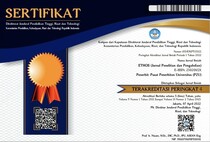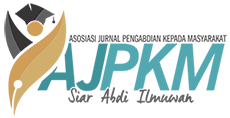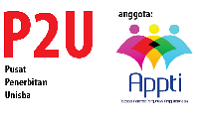THE MANAGEMENT OF INDEPENDENTLY SIMPLE WATER FURIFICATION IN THEORY AND PRACTICE COMMUNITY LEVEL
Abstract
PKM activity is based on the phenomenon of many people who do not get access to drinking water services (SPAM) in standard quality. The PKM Objects is a community in Cikole village Lembang district, Bandung Barat regency whose predominantly work as farmers and use raw water sources to fulfil their needs and even for drinking water direct from the surface water comes from mountain spring water, without the appropriate water treatment standards. The water from the source accommodated through the water reservoirs and then distributed by gravity directly to each home with simple piping systems, without going through the process of screening and testing the water quality in advance. Regarding quality, the water requires the filtering, especially during the rainy season. Therefore through the PKM activity of "The Training of Environmental Sanitation Management: Water Treatment” hopes that the people, besides the understanding the standard criteria of water quality, are also able to do the water treatment through screening models / simple water purification that can be done independently by the community. The PKM activity has involved several related institutions, starting at the level community such as RT, RW, Kadus, water management, Cikole village officials and Lembang district, Bandung Barat regency.
Keywords
Full Text:
PDF (Bahasa Indonesia)References
Jurnal
Da Silva, F. O. E., T. Heikkila, et al. (2010). Developing Sustainable and Replicable Water Supply Systems in Rural Communities in Brazil. The International Journal of Water Resources Development. 629(4), 622-635
Nugraheni, P. & Argo, T. (2011). Identifikasi Upaya Keberlanjutan Pengelolaan Air Minum Perdesaan di Kabupaten Tulungagung. Jurnal Perencanaan Wilayah dan Kota B SAPPK V3N1
Tadesse, A., T. Bosona, et al. (2013). Rural Water Supply Management and Sustain-ability: The Case of Adama Area, Ethiopia. Journal of Water Resource and Protection 5(2), 208221.
Buku Lembaga/Instansi sebagai Penerbit
Bappenas (2003). Kebijakan Nasional Pembangunan Air Minum dan Penyehatan Ling-kungan Berbasis Masyarakat. Jakarta: Bappenas.
Media Elektronik
Anonim. (2004). Estimated Use of Water in the United States in 2000, (http://pubs.usgs. gov/circ/ 2004/circ1268/htdocs/figure11.html, diakses 18 Desember 2015).
Artikel
Masduqi, A. &Wahyono, H, dkk. (2013). Teknologi Penyediaan Air Bersih Perdesaan: Studi Kasusdi Kabupaten Mojokerto. FTSP ITS, (http://personal.its.ac.id/files/ pub/2103 diakses18 Desember 2015).
Peraturan dan Perundang-Undangan
Undang-undang Nomor 26 Tahun 2007 tentang PenataanRuang
Undang-undang Nomor 23 Tahun 2014 tentang Pemerintahan Daerah.
Perraturan Pemerintah Nomor 16 Tahun 2005 tentang Pengembangan SPAM
PERMENPU 14/PRT/M/2010 tentang StandarPelayanan Minimal
Undang-undang No. 23/1997 tentang Pengelolaan Lingkungan Hidup (Pencemaran Ling-kungan Hidup).
Undang-undang Nomor 36/2009 tentang Kesehatan, Bab XI Kesehatan Lingkungan
Perraturan Pemerintah No. 82 Tahun 2001 tentang Pengelolaan Kualitas Air dan Pengenda-lian Pencemaran air.
Permenkes 492/menkes/IV/2010 tentang Persyaratan Kualitas Air Minum
Peraturan Pemerintah Nomor 16 Tahun 2005 tentang Pengembangan Sistem Penyedia-an Air Minum (SPAM).
SNI 19-6773-2002 tentang Spesifikasi Unit Paket Instalasi Pengolahan Air.
Laporan
Mata KuliahStream Perencanaan Wilayah dan Desa (2013). Laporan Rencana Tata Ruang Desa (Village Planning) Cikole, Kecamatan Lembang Kabupaten Bandung Barat.
Profil Desa Cikole 2014. Desa Cikole, Kecamatan Lembang, Kabupaten Bandung Barat, 2014.
Mata Kuliah Stream Perencanaan Wilayah dan Desa (2013). Laporan Rencana Tata Ruang Desa (Village Planning)Cikole, Kecamatan Lembang Kabupaten Bandung Barat.
Profil Desa Cikole 2014. Desa Cikole, Kecamatan Lembang, Kabupaten Bandung Barat, Tahun 2014.
DOI: https://doi.org/10.29313/ethos.v0i0.2253
Refbacks
- There are currently no refbacks.
Alamat Redaksi:
LPPM Unisba, Lantai 2, Jl. Purnawarman 63, Bandung 40116, Jawa Barat, (022) 4203368 , (022) 4264064. ethos.unisba@gmail.com / ethos@unisba.ac.id

This work is licensed under a Creative Commons Attribution-NonCommercial-ShareAlike 4.0 International License.














